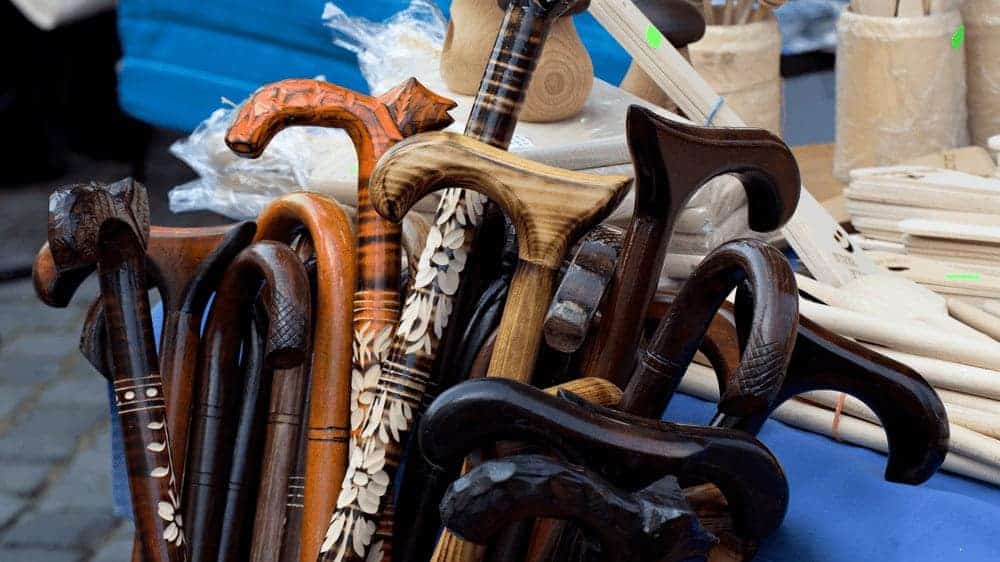How I Got Over My Fears and Started Using a Cane
The same nightmare kept replaying in my mind, in slow motion.
At the height of morning rush hour, I am scurrying to my office. Head down, I’m making a mental checklist of the day’s priorities. The first intersection quickly approaches up ahead. I let out a deep yoga class breath, exhaling through my mouth. My balance is wobbly at best, like a newborn fawn taking its first steps. I look around for something to steady myself but it is too late. And then: Splat! An ungraceful fall leads to an awkward face plant in front of hundreds of other commuters. The worst part is no one helps me. Then I wake up.
These anxious thoughts raced through my head. What should I do about my balance? What would people think of me if I used a cane? What would they say? Aren’t walking aides are for older people?
My biggest fear about my recurring vision wasn’t solely about losing my balance. It was acknowledging the end of a period in my life, one represented by falling. I have a rare genetic condition called ataxia, which affects my balance and coordination. It’s degenerative, which means my symptoms worsen over time. I have already lost the ability to walk in high-heeled shoes. The last time I wore heels was five years earlier at my wedding reception. That feels like a lifetime ago. Would I never walk without a cane again?
I also feared the damage to my ego if I used a walking aide. One of the scariest aspects about my nightmare was that I always had an audience. At 8 AM, I was always crossing the intersection with 50 pairs of eyes on me. Experiencing a fall would not only be embarrassing, but it would also require the willingness of a kind stranger to help me up. The vision left me feeling extremely vulnerable and exposed.
My ataxia diagnosis came about six years ago with the results of a genetic blood test. I started experiencing signs of it about ten years ago. For a long time, it was easy to disclose details on a need-to-know basis. I could reveal personal information or choose to keep it to myself as my little secret. I worried how using a cane would change this, how it would be a visible representation of my condition, making it acceptable for people to riddle me with questions about my condition. Suddenly my business felt out of my control.
So, what finally tipped the scales and pushed me to get a cane? The realization that my desire to disclose my disability at my own pace was rooted in a control issue. A cane would be a visible reminder that my disability, like many other challenges, is beyond my control. I would have to mourn this change just like I had mourned high-heeled shoes. Acknowledging this loss was an important part of coping with my condition. I knew I had to get over the nostalgia of my unassisted walk, my bruised ego, and my feelings of vulnerability.
The final decision about purchasing a cane came down to actually avoiding the embarrassment I feared and gaining independence. As time progressed, my walk felt increasingly unsteady. My recurring rush hour fall nightmare became a matter not of if, but when. I realized the embarrassment of using a cane was far less worrisome than falling in front of an audience. Also, I wouldn’t have to pray for a kind person to be there if I fell. I would be able to maneuver anywhere by myself without having to depend on anyone. Anything that helps me maintain my independence is a definite positive for me.
I have now been walking with a cane for about a year and it has vastly improved my mobility. I do get some questions from people, but it’s been nothing too intrusive. I have learned to take the ups with the downs of my disability as they come. I have made peace with my lack of control of my disability. Honestly, my cane makes life better! I’m glad my perspective has changed, and I truly appreciate all of my cane’s great benefits.
About Rooted In Rights
Rooted in Rights exists to amplify the perspectives of the disability community. Blog posts and storyteller videos that we publish and content we re-share on social media do not necessarily reflect the opinions or values of Rooted in Rights nor indicate an endorsement of a program or service by Rooted in Rights. We respect and aim to reflect the diversity of opinions and experiences of the disability community. Rooted in Rights seeks to highlight discussions, not direct them. Learn more about Rooted In Rights




Great article Fatima! Thanks for being vulnerable and sharing. It’s been awhile, but I look forward to seeing you in these streets! Be safe, Be Well!
My my my. So profound! A wonderful read Soror. Continued blessings.
Helen LaMar
Thank you for this. It’s powerful.
It is courageous of you to share, and you are an inspiration to others facing the same challenge. My hat is off to you!
Lovely article! Thank you for your vulnerability and thoughtfulness.